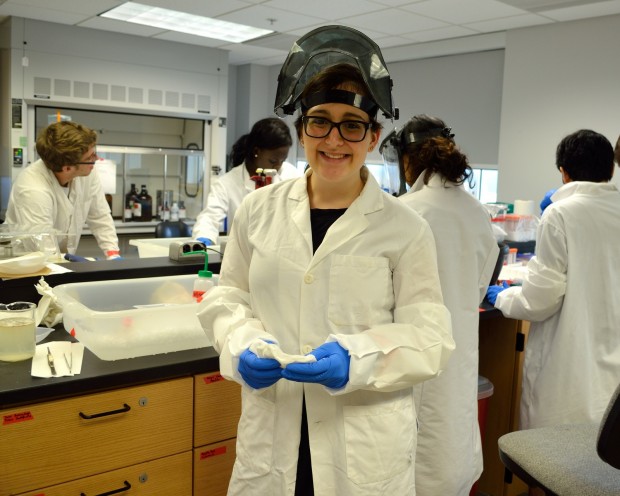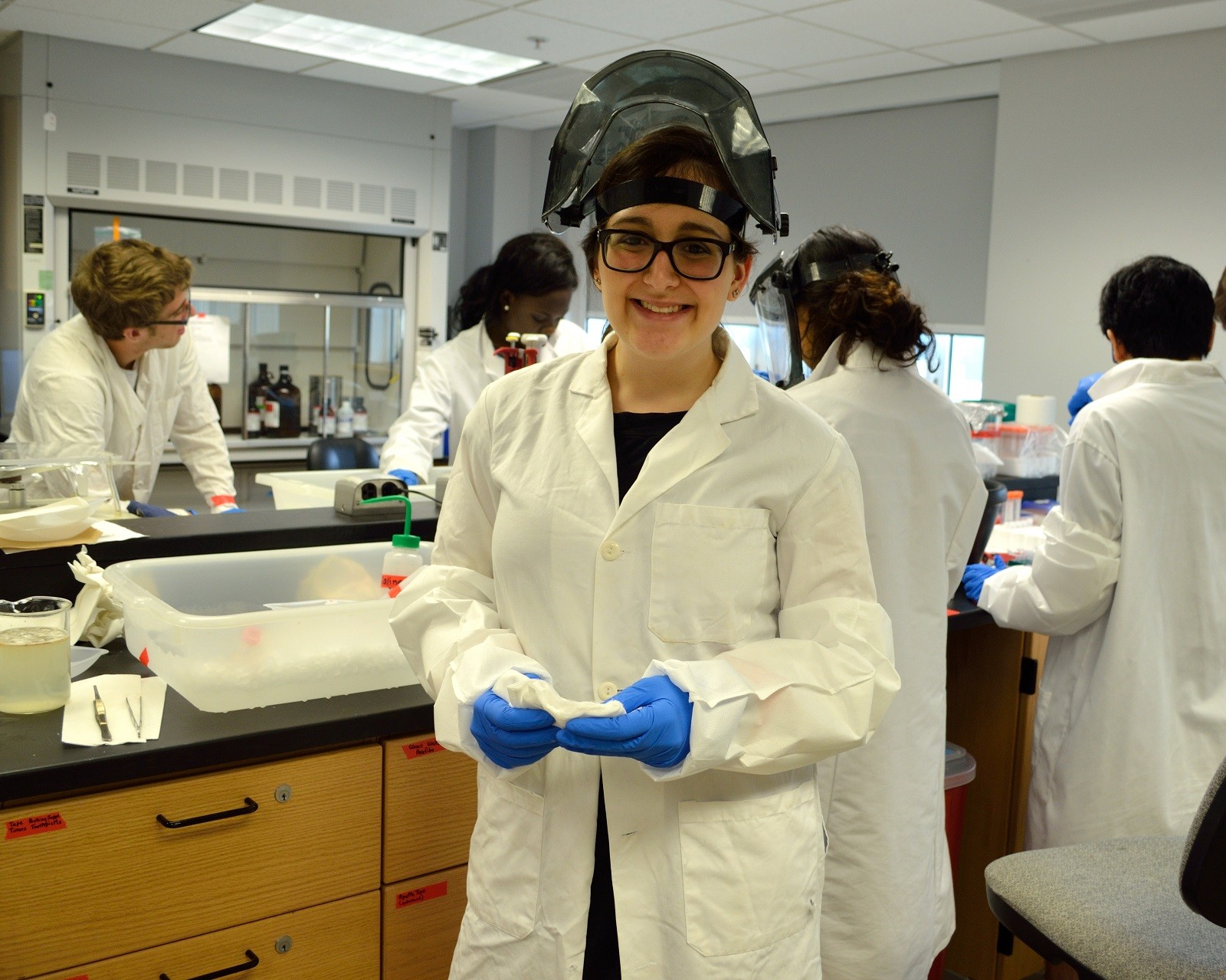Primary tabs
Undergraduate Research

Research: Available to all Cornell undergraduates
Participating in research has many benefits, even if research is not part of your long-term career goals. Research provides important practical experience in the scientific process, from conceptualization of research questions and study design to implementation and even publication. Research experience is recommended or required for many educational and professional opportunities, and may yield helpful recommendations or professional connections.
Some DNS majors (NS, HBHS, or GPHS) majors who engage in undergraduate research also participate in the DNS Honors Program, described below.
A variety of opportunities exist for undergraduates in DNS to become involved in research at Cornell. Students who wish to participate in research for credit should check the current Class Roster for course-specific instructions. These opportunities fall under four general categories.
| Opportunity | Description | Enrollment | Credit policies |
| Research for credit with a DNS faculty member | Students first identify the kind of research they are interested in and then contact faculty members with relevant research to see whether and how they may become involved (see below for tips). The student and faculty member then discuss details and outline an agreement for the student’s research work. | Both CHE and CALS enroll through the online CHE Special Studies Enrollment Form. |
Students may enroll in a maximum of 4 credits of NS 4010 per semester. Students must first take 2 S/U credits before enrolling in graded credits. Students may petition to waive this requirement by having their PI email dnsstudentservices@cornell.edu describing and approving preparation to enroll in graded credits. |
| Research for credit with a non-DNS faculty member |
DNS students may participate in research in other departments, both within and outside their College, registering for research credit through that department (e.g. BIOG 4990, HD 4010, or other equivalent of NS 4010). This brings many of the same benefits as research within DNS and also helps to diversify a student’s content knowledge and expertise. Research that is unrelated to human health and/or nutrition may affect a student’s eligibility for the DNS Honors Program. |
Inquire with home department of research advisor |
non-NS research credits cannot be used for advanced NS elective credits (NS majors only). Research outside a student’s College cannot be used for College elective credits. |
| DNS Honors Program | DNS majors (NS, HBHS, and GPHS) with strong academic records who are engaged in research (with a DNS or non-DNS faculty member) may apply to the DNS Honors Program. Students apply with a confirmed faculty advisor and a proposed project, so they typically have completed 1-2 semesters of research in the same lab by that time. For more information, see the DNS Honors Program pages in this Roadmap. | Both CHE and CALS enroll through the online CHE Special Studies Enrollment Form. |
In their final two semesters, admitted Honors Program students enroll in NS 4990. NS 4990 grades are determined by the DNS Honors Program Director with input from research mentor. |
| Research for pay | Some students are able to secure funding toward wages for research, e.g. College via fellowships or through faculty PIs grants | See "Funding for Summer Research" below. |
Students paid hourly for research may not also receive credit. |
| Research as a volunteer or unpaid intern | Students who do not receive funding or academic credit for their research register as a volunteer or unpaid intern, especially in the summer, for safety, liability, and ongoing access to campus resources. | Discuss with your faculty PI and have them confer with DNS Human Resources. | N/A |
The Honors Program in the Division of Nutritional Sciences is designed to challenge research-oriented NS, HBHS, and GPHS majors, including those who work in non-DNS labs. The Honors Program is a structured research-based experience that focuses and builds on a student’s ongoing research, and involves:
- NS 3980, an introductory course in research (fall junior year for spring graduates)
- Successful application to the DNS Honors Program (spring junior year for spring graduates)
- A multi-semester independent research project, mentored by a faculty PI (junior and senior years)
- Completion of a written thesis that reports the research (final two semesters)
- Oral presentation of research at the DNS Undergraduate Honors Symposium (final semester)
Many DNS students participate in research through an independent study or employment, with or without applying to the DNS Honors Program. Read more about getting involved in undergraduate research elsewhere on this page and about DNS faculty research. Interested students should review the Honors Program page in detail and then contact dnsstudentservices@cornell.edu with further questions.
The first step to engaging in research is to explore opportunities – often a semester before the semester in which research is planned to begin.
Most often, students work directly with a Cornell faculty member on a project within or related to the faculty member’s research. As a result, exploring opportunities primarily involves connecting with potential faculty research mentors to discuss your interests and goals. However, available positions of interest may also be listed on Cornell’s Undergraduate Research and Experience Cornell websites.
Identifying potential faculty research advisors
The availability of research positions depends on the size and scope of faculty members’ projects, the staff and financial resources available to them, and other factors. Cornell faculty pages include detailed information about their research interests and activities.
To identify potential faculty research advisors, search for faculty members who investigate problems of interest to you (e.g. infant nutrition or lipid metabolism) and/or who employ research methods of interest to you. You might also start your search within departments of particular interest and/or talk with academic faculty advisors, the instructors of courses that interest you, and students in other majors for suggestions on appropriate potential faculty research advisors to contact.
Contacting and talking to potential faculty research advisors
Make an initial contact that brief and tailored, including a statement of who you are and your specific interest in their work as well as an updated copy of your resume. Before meeting with a potential research advisor, take some time to write your thoughts and questions about their current and future research projects, activities and expectations among their undergraduate researchers, your interests in research and their research group, and your availability and preparation for engaging in research.
Many students need and/or want to explore sources of funding for research conducted over the summer, and several sources of research funding are available. Possible sources of funding or information about funding include:
- DNS Research Awards
- The student’s College:
- CHE: CHE students working full-time with CHE faculty may apply for a CHE summer research stipend
- CALS: CALS students may apply for CALS undergraduate research grants. CALS students who are underrepresented minorities may apply for the CALS Diversity Committee fund for Undergraduate Minority Research.
-
The Cornell Office of Financial Aid and Student Employment websites
-
The Research Funding page of the Cornell Office of Undergraduate Research
-
Undergraduate research funding available through scientific and professional societies
-
Undergraduate research funding available through your research mentor’s standing research grants
One of the many things that students learn in research is how to apply statistics classes to real data. The Cornell Statistical Consulting Unit (CSCU) is here to help! Students involved in research projects are encouraged to seek assistance from CSCU for the design of research projects, the planning, implementation, and write-up of statistical analyses, the interpretation of output, and the write-up of results for reports or publications. Help is available by appointment or during specified walk-in hours; see the CSCU website for more information.
Supervised Fieldwork Available to all NS, HBHS, and GPHS majors
Structured learning experiences in the real world (i.e., the “field”) help students link theory to practice. Students also learn about communication, team work, setting goals, client needs, and the social, economic and political forces that influence professionals who work in the food, nutrition and health fields. Students who wish to participate in research for credit should check the current Class Roster for course-specific instructions.
Students may conduct supervised fieldwork in a variety of topic areas settings. For example:
- Nutrition and fitness: Advanced nutrition students serve as nutrition counselors to student athletes and members of local fitness clubs.
- Community nutrition: Students work with local Cooperative Extension professionals and others in developing and pilot testing educational programs for adults and children.
- Nutrition and business: Students intern with a local software firm to learn about developing and testing food composition data bases, dietary assessment instruments, and food management programs for use by the health care industry.
- Nutrition and health care: Students examine how nutritionists and other health care practitioners treat and counsel patients with different conditions and the many factors that influence how these professionals conduct their work.
- The Practicing Medicine: Health Care Culture and Careers Program: Based in New York City, this summer program is an excellent opportunity to gain field experience. All undergraduate students who have completed their freshman year are eligible to apply. More information is available on the Practicing Medicine: Health Care Culture and Careers website.
Students can earn credit for a planned field experience through NS 4020 Supervised Fieldwork. This fieldwork is “supervised” in that the student registers for this credit through a DNS faculty member, who evaluates the student’s work. Participating in fieldwork through NS 4020 requires several components:
1. Planning: Students must plan fieldwork with a DNS faculty member in advance, with explicit goals,planned activities, and expected outcomes determined before the NS 4020 registration.
2. Registration: Once an agreement is reached, the both CHE and CALS students must submit an online Special Studies enrollment form through CHE to enroll. On this form, the student will have to describe the content of their fieldwork as agreed upon with their DNS faculty supervisor. NOTES:
- Maximum of 4 credits of NS 4020 per semester.
- Must first take at least 2 S/U credits before allowed to register for graded credits.
3. Communication with their DNS faculty supervisor via regular conferences in person or by phone or email. The fieldwork experience also must include a reflective component (e.g. an analysis of a journal or systematic record of the experience) to allow the student to consider their feelings, attitudes, and understandings as well as the applications of classroom learning to practice. The student’s work also must be evaluated by the faculty supervisor.
IMPORTANT NOTES:
- The basis on which a student’s grade will be determined must be agreed upon in advance with the faculty supervisor (e.g. by evaluating journals, papers, oral presentations, input from field supervisors, and/or other materials developed as part of the experience).
- The number of credits also must be determined in advance. For 1 academic credit, the student should be working in the placement or on materials relevant to the placement an average of 3-4 hours per week for 14 weeks. This time is in addition to that spent with the faculty member.
Contact us dnsstudentservices@cornell.edu

